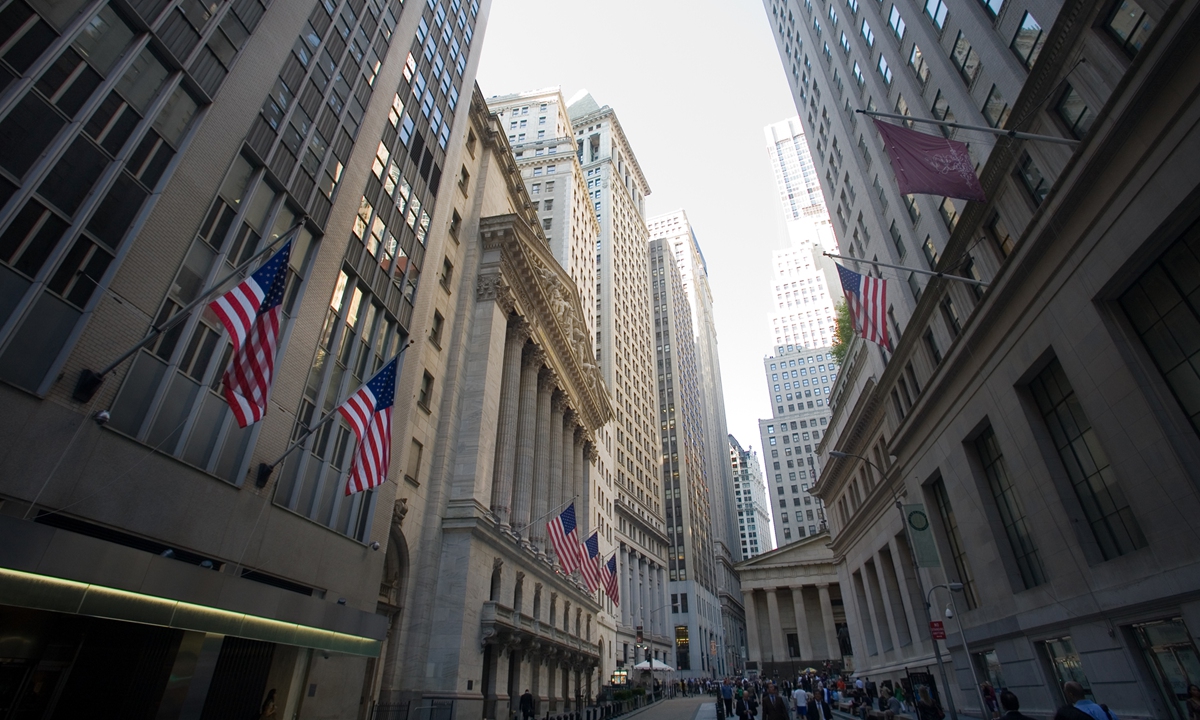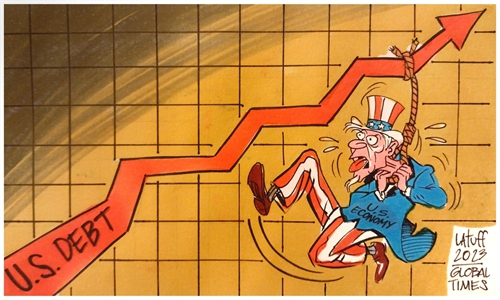Opinion: US debt limit negotiation hasn’t reached a deal, casting a shadow over global markets

A view of Wall Street in New York, the US Photo: IC
The latest round of talks between US President Joe Biden and House Speaker Kevin McCarthy on raising the country's federal debt ceiling ended without a deal on Monday, with both sides accusing each other of intransigence. The failure to compromise and reach a deal prompted growing market jitters that the deadlock may continue and possibly exacerbate ahead of the early-June deadline, which will trigger an unprecedented US government default.
The debt ceiling is a spending limit set by US Congress which determines how much money the federal government can borrow. The current debt limit is $31.4 trillion, which is likely to be breached on June 1, according to the US Treasury Department.
Failure to raise the debt limit could result in the US defaulting on its huge borrowings - meaning the Biden administration could not borrow any more money to pay its bills and obligations such as veterans and servicemen, retirees' pensions and medical subsidies. Also, the country won't have money to pay back interest and principals to US Treasury bonds holders.
The stakes are very high. A default will almost certainly wreak havoc on the US financial market and lead to a severe economic crisis in the US, which will swiftly spill over to other parts of the world.
To avert a default and its catastrophic consequences, it is the responsibility of the US government, the Biden administration and the Congressional lawmakers, led by the Republican Party, to put down their partisanship and long-time feuding, prioritize the fundamental interests of tens of millions of ordinary Americans, and make due compromises in their negotiations and reach a deal at the earliest date, in order to prevent an economic disaster from happening.
China, together with Japan, Ireland and Britain, is among the largest holders of US Treasury bonds. These countries are obliged to ask Republican and Democrat leaders in the US to work together, not to harden demands and thrash out a compromise deal on raising the debt ceiling before tumbling off a cliff.
US Treasury Sectary Janet Yellen earlier issued a stark warning to Congress, saying the country would likely run out of money to pay its bills as early as June 1, which is called the "X-Date", if a deal is not reached on increasing the debt cap and the risks are real. "If our Congress fails to increase the debt limit, it would cause severe hardships to American families," her statement read just a week ago.
The Biden administration has accused the Republicans-controlled Congress of disregarding America's economic security and taking the debt ceiling hostage to "blackmail" his administration and American people. Biden and Democrats have ramped up their accusations alleging Republican lawmakers are using the threat of debt ceiling crisis and US' economic destruction to exert political upper-hand. As the two parties are engaged in the brawl, the market is feeling the heat.
Even if a deal is struck prior to the last minute to the "X-Date", the long period of uncertainty could drive up American borrowing costs, lead to a pullback in public and corporate investment, and harm the already fragile US economy, which is facing a stubbornly high inflation despite the Federal Reserve's aggressive interest rates hikes, and a shaky banking system in the aftermath of the abrupt collapse of three local lenders - the Silicon Valley Bank, the Signature Bank and the First Republic Bank in March and April.
During the talks, the Republican leaders headed by House Speaker Kevin McCarthy are reportedly calling for as much as $100 billion in cuts to 2024 fiscal-year federal spending. Democrats led by Biden hope to avoid any reductions in government spending, particularly to new programs and spending approved during the first two years of Biden's presidency. A compromise is deemed difficult, as Democrats on Biden's left and Republicans to McCarthy's right would view any concessions as a betrayal of their respective bedrock political principles.
The standoff may diminish long-term faith in the stability of the US financial system with some lasting repercussions on America. At the current stage, US financial market drops were only modest, suggesting that investors are betting that the two parties will come to an agreement before the "X-date" arrives.
But some economists are arguing that the lawmakers are exercising dutiful oversight over the Biden administration's levels of borrowing and spending, which is legal bound and financially prudent and does the country long-haul good. When Biden took office in January 2021, the federal debt level stood at $27.8 trillion. Now, 27 months later, the arrears have swelled to $31.4 trillion or 122 percent of its GDP, a record high for the country.
To make things worse, the US central bank, to fight inflation, has raised its benchmark interest rate to 5-5.25 percent, highest since 2007. Higher interest rates means the US government will have to pay more for its huge borrowings which raises questions about its ability to service its huge debt. The country's annual interest obligations are forecast to surge to $1.2 trillion in 2032, according to the Congressional Budget Office.
For the country's long-term economic security, the lawmakers are obliged to attach some strings to US government's spending largesse. For example, if the Biden administration wants to maintain current annual $1 trillion or so spending on defense and veterans, Congress could seek a trade-off in cutting appropriations to Social Security, Medicare, education, environment and other non-essential areas of spending.
Perhaps there is an effective measure to prevent the US' national budget deficit from drastically increasing - to proportionately raise taxes on wealthy Americans and giant corporations, coupled with a moderate reduction in government spending. Only when the country's revenues grow and expenditures are curtailed, can it avoid a fiscal implosion and economic recession in the coming years.


